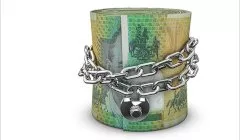Borrow
Will a personal loan hurt my credit rating?
Like any other form of credit, a personal loan can affect your credit score, either positively or negatively, so it is important to know the risks and advantages before you take on one.
Will a personal loan hurt my credit rating?
Like any other form of credit, a personal loan can affect your credit score, either positively or negatively, so it is important to know the risks and advantages before you take on one.

You’re facing an unexpected medical bill. A burst water pipe in your house has caused significant damage, destroying your walls, floors and belongings while racking up a huge repair estimate from the plumber.
An unplanned holiday getaway that was not part of your budget has suddenly come up. And the worst part in these scenarios is that you do not have an emergency fund and your credit card has already been maxed out.
It may sound surprising, but taking on more debt may be the best solution to these problems. A personal loan may be the first option that comes to mind, as it gives you a way to finance major expenses when you don’t have cash on hand.
However, you may be concerned about the impact of a personal cash loan on your credit rating.
Like any other form of credit, a personal loan can affect your credit score. It may affect your credit rating either positively or negatively, so it is important to know the risks and advantages before you take on one. Keep on reading to know how a personal loan might impact your credit rating.

What is a personal loan?
A personal loan involves borrowing a specific lump sum of money (typically from a trusted financial institution) and repaying the amount with interest in equal installments over an agreed period of time. Oftentimes, monthly repayments for this debt can be over a period of one to five years.
Personal loans can be used for pretty much anything, but it is commonly used to fund expensive items, such as home renovation, a new vehicle or a wedding. Personal loans can also be utilised for unexpected expenses, including healthcare bills.
There are different types of personal loans for specific purposes. These include secured and unsecured, fixed rate and variable rate. There are also debt consolidation loans, car loans and even wedding loans offered by financial institutions.
When choosing a personal loan, make sure to compare your options. It is advised to choose a personal loan that will save you the most in terms of interest and fees. You may use a personal loan calculator to see which loan is most suited for your situation.
Personal loans have a general advantage over the usual alternatives. Personal loans have relatively lower interest rates compared with other options such as credit cards or payday loans.
Most personal loans give the borrowers the option to make an extra repayment. Every dollar on top of the required repayment amount will shorten the loan’s period and the overall cost.
If you want to learn more about personal loans, read here.
How a personal loan can benefit your credit rating
Credit reports show more than just “black marks” against your name. They also provide the following information:
- The credit limits on credit cards you own.
- A record of your monthly repayments for credit cards, loans, mortgages and other bills, including utilities. The report can also reveal if you make repayments on time.
- The type of accounts you’ve had and when they were opened and closed.
If you have been approved for a personal loan and managed to settle your payment within the given period, here are the ways personal loans can benefit your credit rating:
Improve your payment credibility: Making your personal loan payments on time helps to establish a positive payment history. If you have been approved for a loan and paid the debt on time, it is a good indication for banks that you will pay off a future loan from them and eventually boost your credit score.
Helps you build a better credit history: Having different types of credit or debt helps to boost your credit rating. As mentioned, if you are successful in opening a number of accounts, including a credit card, personal loan and for utilities, any future application you make will have a more positive impression for different types of loans. If most of your credit is from revolving credit such as a credit card, taking on a personal loan can improve your credit profile.
Lowers credit utilisation ratio: Your credit utilisation ratio is the amount of credit you’re utilising compared with the amount of credit available to you. Because personal loans are paid on an installment basis, it will not affect your credit utilisation ratio. You may use a personal loan to pay off revolving credit such as credit card debt. This will help boost your credit rating by replacing the revolving debt (which is factored in your credit utilisation ratio) with a personal loan.
There are many ways to boost your credit score. Read here to see how you can improve your rating.
How a personal loan can hurt your credit rating
Given all these benefits, you may be ready to fill out that personal loan application. But not so fast – there are also downsides to personal loans. Here are ways a personal loan could negatively impact your credit score:
Creating too many hard pull inquiries on your credit report. When you fill an application for any type of credit, lenders will do a hard pull credit inquiry, which involves an official check of your credit report. A hard inquiry negatively affects your credit rating. A decline from a single hard inquiry will only last for a few months. But if you frequently apply for a personal loan, too many hard inquiries can have a significant damage to your credit rating. It is also unlikely that your application will be approved.
Result in more debt. A new personal loan means getting deeper in debt, which in turn can hurt your credit rating. Change any habits that got you in debt in the first place. For example, if you use a personal loan to pay off a maxed-out credit card, refrain from charging more than you can afford on that card once again.
Incur additional fees. In addition to interests, you also have to be mindful of other loan fees including origination fees or late fees. Before applying for a loan, make sure that you know all the fees involved during repayment.
Managing personal cash loans
Most borrowers think that paying off a personal loan within a shorter period than required is a good move. However, there is no actual benefit to doing this.
Additionally, the whole point of adding a personal loan to your credit history is to show that you are responsible for repaying an installment credit that has a longer time frame. If you want to have a longer positive credit history, you should maximise the recommended payment period.
But if you are a low-income earner or have a tendency to overspend, it is advisable to pay off your loan in the shortest time possible.
Conclusion
A personal loan could be a financial lifesaver for any situation you are facing. If you manage your personal loan well and make payments without falling behind, it can be an opportunity for you to build your credit score.
On one hand, if your credit history shows overdue bills or payment defaults on your personal loan, it could hurt your credit rating.
Explore nestegg to learn more about personal loans.

Personal cash loans
The smart borrower’s guide to managing personal loans
Personal loans can be a strategic tool for managing finances, whether consolidating debt, financing a large purchase, or covering unexpected expenses. However, borrowing money comes with the ...Read more

Personal cash loans
Will these changes to joint account data sharing impact you?
The government is being asked to respect citizens’ rights to consent to data sharing after the Treasury’s opt-out join account data sharing model failed to impress consumer groups. Read more

Personal cash loans
What are term deposit interest rates?
When deciding where to stash your hard-earned savings, there are several factors to take into consideration. Read more

Personal cash loans
Can you negotiate term deposit rates?
Getting the best interest rate is the key to making extra money in the long term. It may come as a surprise, but negotiation is one of the best ways to maximise your term deposit rate. Read more

Personal cash loans
Will personal loans affect my mortgage application?
A personal loan isn’t completely bad news in the eyes of mortgage lenders. Read on to see how your personal loans can affect your mortgage application. Read more

Personal cash loans
What is a personal cash loan?
A personal cash loan is a type of secured or unsecured loan that typically have terms ranging from six to 60 months. Read more

Personal cash loans
Buying now for happiness later
Four in five Australians think the use of buy now, pay later services improves their happiness and self-esteem, a report has revealed. Read more

Personal cash loans
Short-term ‘predatory’ lending practice banned
ASIC has announced a ban on a short-term loan model that saw consumers able to be charged fees that added up to almost 1,000 per cent of the original loan amount. Read more

Personal cash loans
The smart borrower’s guide to managing personal loans
Personal loans can be a strategic tool for managing finances, whether consolidating debt, financing a large purchase, or covering unexpected expenses. However, borrowing money comes with the ...Read more

Personal cash loans
Will these changes to joint account data sharing impact you?
The government is being asked to respect citizens’ rights to consent to data sharing after the Treasury’s opt-out join account data sharing model failed to impress consumer groups. Read more

Personal cash loans
What are term deposit interest rates?
When deciding where to stash your hard-earned savings, there are several factors to take into consideration. Read more

Personal cash loans
Can you negotiate term deposit rates?
Getting the best interest rate is the key to making extra money in the long term. It may come as a surprise, but negotiation is one of the best ways to maximise your term deposit rate. Read more

Personal cash loans
Will personal loans affect my mortgage application?
A personal loan isn’t completely bad news in the eyes of mortgage lenders. Read on to see how your personal loans can affect your mortgage application. Read more

Personal cash loans
What is a personal cash loan?
A personal cash loan is a type of secured or unsecured loan that typically have terms ranging from six to 60 months. Read more

Personal cash loans
Buying now for happiness later
Four in five Australians think the use of buy now, pay later services improves their happiness and self-esteem, a report has revealed. Read more

Personal cash loans
Short-term ‘predatory’ lending practice banned
ASIC has announced a ban on a short-term loan model that saw consumers able to be charged fees that added up to almost 1,000 per cent of the original loan amount. Read more










